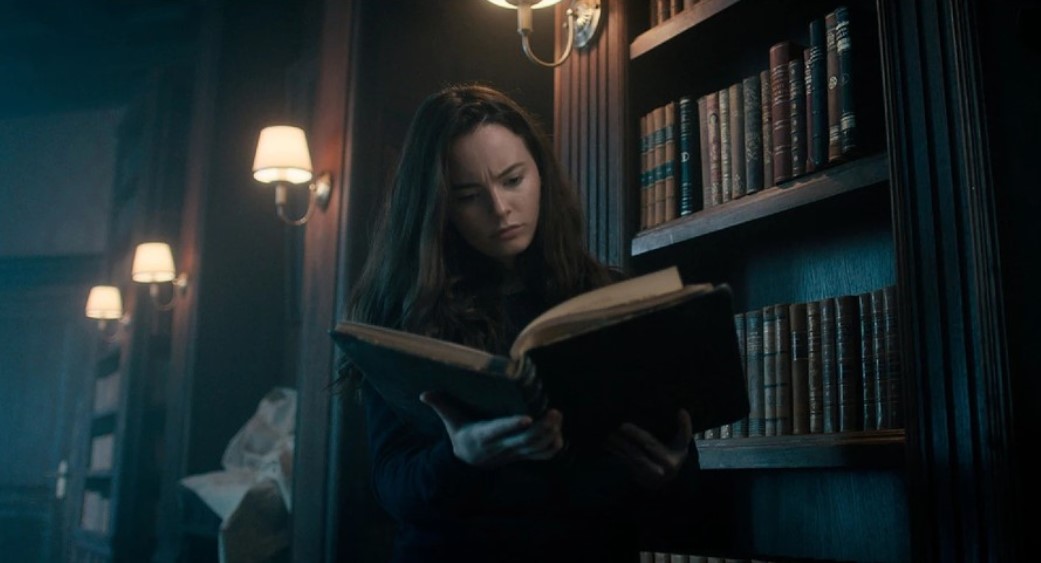Sound and Fury, by Reed Lackey
10 Jan

For a film to effectively evoke 19th century gothic, literary horror, it must be unified visually and tonally. The Sonata, the debut feature film by director Andrew Desmond, also manages to evoke the narrative sensibilities and structure as well.
Rose Fisher, a prodigy violinist, successful but unfulfilled, inherits the estate of her late father, who was also a world-renowned musician. Her relation to the legendary composer had been intentionally kept a secret, even from her displaced and curious agent, until his passing prompts a reclusive retreat for her to spend time figuring out what she wants from her future. What she doesn’t know (at least at first) is that her father killed himself rather violently and that he left behind a strange sonata, which would surely ignite the composing world but may also bring about the literal antichrist.
The very first thing which impressed me about The Sonata was the production itself. It is skillfully shot, with the flourishes you might expect from a haunted estate story never becoming overbearing or pretentious. The story also pivots unexpectedly between the primary (supposedly) story of the daughter parsing out her future in the shell of her estranged father’s estate with her newly estranged agent seeking an understanding about this sonata her father left behind. Since the bulk of the estate plot contains only a single character, this narrative volley keeps the pace steady and boosts the film’s knack for maintaining audience engagement. Desmond clearly has compelling directorial instincts and they serve him well here.
Likewise, the performances are solid, populated with relative unknowns (the largest name in the cast is the late Rutger Hauer as the deceased and mysterious composer) who deftly navigate rather direct scenes and bring vibrancy to them. Freya Tingley as Rose is confident and assured, making it easier to accept and digest that a character of her youth would seek the quiet isolation her inheritance has afforded her. The story demands the most of Simon Abkarian, who plays Rose’s agent struggling to navigate her eccentricities while also trying to obtain a firm understanding of the mysteries surrounding her father’s last composition. Abkarian meets the challenges with confidence and brings a grounded approach to the character which often subverts the easiest choices in a given scene.
The whole piece is consistently captivating and often highly intriguing, which makes it quite a bit disappointing when the ultimate reveal of the sonata’s mystery feels rushed, forced, and surprisingly predictable. Much is made of this mysterious composition throughout the story, but the ultimate consequence, while frightening in implication, does not pack nearly the punch the characters do in their search for it. Even in the climactic confrontation, it is the work of the actors that drives the tension in the scene while the monstrous reveal tends to deflate that same tension.
This final confrontation may frustrate viewers quite a bit, but do not dismiss it too easily. As mentioned at the start, The Sonata not only evokes the tone and visual style of an old Algernon Blackwood or M. R. James story, it also aligns impressively with the structure of those stories as well. It focuses in detail on the elements of the mysterious composition at its center, while satisfying itself to display the ominous atmospheric components rather than work very hard to explain them. It also leaves the resolution much closer to where stories of that sort might have left it, bearing witness to dreadful occurrences for which there is little to no opportunity to explain or comprehend. While this may perturb the casual viewer who expects a tighter backstory, I found it more compelling as a result.
While imperfect as a whole, with particular disappointment surrounding the supernatural elements of its conclusion and a script which could have danced around a bit more with the suspense, The Sonata boasts a strong sense of atmosphere, noteworthy performances, assured and focused direction, and some impressively effective frights which make any quibbles about the ending very easy to dismiss.



No comments yet